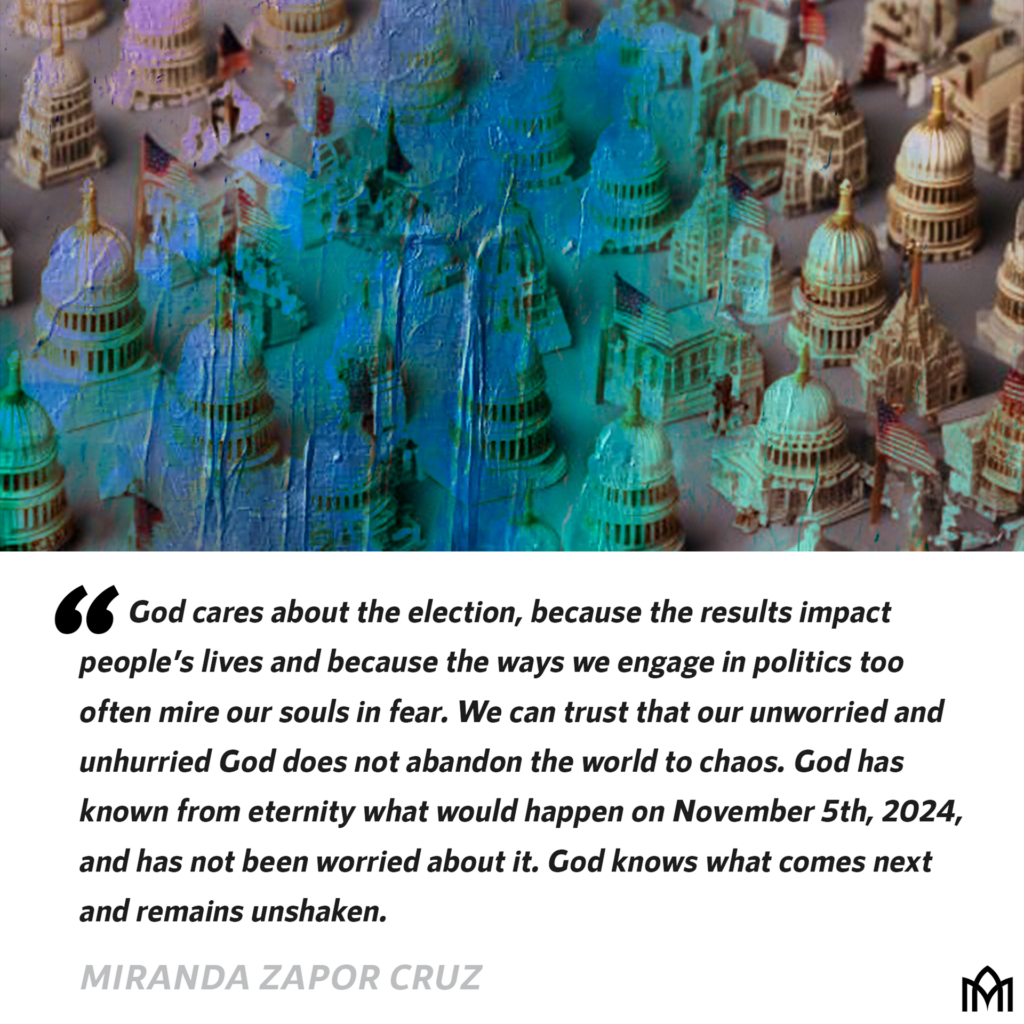Faithful Responses to Election Results
For Kingdom and Country (Faithful Politics, Part 3)

*Note: This piece was written prior to November 5th, the day of the 2024 U.S. Presidential Election. ~MZC
In the days after the U.S. Presidential Election, my student is eager to get coffee again. She needs to process what the election results mean for Christians, and how we can respond faithfully. She’s had time to think about dual citizenship and she’s carefully considered different faithful approaches to political engagement. But now the results are in. She is seeing some friends and family panic while others rejoice. Some have seemed to abandon hope, while others talk of hopes fulfilled. It strikes her as off somehow, but it’s difficult to articulate what is not quite right about the reactions. So, we’ll gather at the table again, with the comfort of warm drinks and safe fellowship, to explore how we can follow Christ faithfully now that the election is over. As we keep our eyes on Christ and seek God’s Kingdom first, we have things to remember and actions to take.
We Can Remember Who God Is
Remembering means more than recalling the past. When we re-member, we pull together scattered pieces and make them real again. We re-collect what we might otherwise forget. When we remember our baptisms, or remember Christ’s death and resurrection in Communion, we are reclaiming as present reality things that have happened in the past. As we process the election, we can remember who God is, and we can reclaim where our hope comes from.
Here are two core truths about God that we can re-member as a faithful response to the election results, however you may feel about them:
God is not worried.
Many of us have anticipated this election with fearful worry, with anxiety for the unknown of the results and of what could come in the next national and local administrations. In the midst of our worry, we can take comfort in remembering that God is not worried. The Maker and Sustainer of the world does not watch from a distance with fearful anticipation of what choices creatures will make. God is not nervously fortifying God’s Kingdom against impending invasion or collapse. God’s redemptive work in the world is not derailed by the US or any other country’s elections.
God does not worry, but neither is God indifferent. God cares about the election, because the results impact people’s lives and because the ways we engage in politics too often mire our souls in fear. God is our comforter and present help in our worry, and is beckoning us toward freedom. God is calling us out of our anxious anticipation into the confidence of children of God whose sovereign Lord is unshaken. We can trust that our unworried and unhurried God does not abandon the world to chaos. God has known from eternity what would happen on November 5th, 2024, and has not been worried about it. God knows what comes next and remains unshaken.
Christ is our hope.
Politicians and their pundits would have us believe that their plans for governing are America’s only hope. They carefully select words and images to create a hopeless picture of the future under their opponent’s leadership, in contrast with the hope that they promise. Susceptible to this rhetorical manipulation, Christians are tempted to orient our hope or despair around the results of elections, Supreme Court decisions, or the passage or failure legislation.
Christians react to the election results as if they have apocalyptic significance. For those who see the results as victory, it it like the apocalypse of 1 Thessalonians 4 – the Son of God coming on the clouds in triumph to claim his kingdom. For those Christians who see the results as defeat, it is like the apocalypse of St. John in Revelation 13 – a beast rising up to maim and destroy. But an election is not an apocalypse, it is an election. It has temporal significance, and relief or concern are both valid reactions. An election has no power to bring the Kingdom or to destroy it. When we misplace our hope or despair in the political machinations of mere mortals, that tends toward idolatry. We must intentionally pull ourselves away from hoping or despairing in the election results to re-place our hope in Christ alone.
When we re-member, we pull together scattered pieces and make them real again. We re-collect what we might otherwise forget. As we process the election, we can remember who God is, and we can reclaim where our hope comes from. (1/3) Share on X
Our unworried and unhurried God does not abandon the world to chaos. God has known from eternity what would happen on November 5th, 2024, and has not been worried about it. God knows what comes next and remains unshaken. (2/3) Share on X
When we misplace our hope in the political machinations of mere mortals, that tends toward idolatry. We must intentionally pull ourselves away from hoping in the election results to re-place our hope in Christ alone. (3/3) Share on X
And here are three central actions that we can reclaim in hope as followers of Christ, in order to live out a faithful response to the election results, however you may feel about them:
We Can Reclaim Where Our Hope Comes From
The end of the election cycle may come as a relief. Whatever the results, we can be glad the season is finally over. But relief may also cause us to disengage from the election’s consequences. If our candidate won, we may feel like our work is done. If our candidate lost, we may feel like there’s no reason to bother any more. But our Christian faithfulness is not bound up with or dependent upon elections, and now that this one is over we have some important work to do to.
Mitigate harm.
One of our political delusions is that our preferred policies will bring about unequivocal good. In a world as complex as ours, that simply is not the case. Policies and politicians that we have supported will benefit some and harm others. The harm may be an unintended consequence of a worthwhile good, but it is still harm. The harm might pair with overall benefits, but it is still harm. We need to take care to recognize where policies we support cause harm, and determine in what ways we can personally redress these harms for which we are indirectly responsible. Our tendency is to ignore, deny, or diminish the harm caused by things we support. We must be clearsighted and open to seeing the negative along with the positive. When the shortcomings in a policy solution become clear, we can determine what is within our power to address, then take action. The action may be interpersonal and local or larger in scale, but we cannot excuse ourselves from addressing harms wherever we discover them. We should not deflect or attempt the justify the harm, just get to work making it better.
Repair relationships.
Too many Thanksgiving tables and Communion tables have been bowing under the weight of anger, fear, distrust, alienation, stubbornness, and judgment. Too many Christians have disobeyed the command to love our neighbor as ourselves when our neighbor does not share our politics. We have justified our condemnation and ghosting and passive-aggressiveness, while retreating into our political tribes. Churches and households have divided, and instead of Christians bearing witness to our unity in Christ, we have amplified the divisions in society and even covered them with a spiritual veneer. Now is the time to take stock of our relationships and begin to repair what has broken. It might be easier to attach ourselves to the grand work of reconciling the church before we’ve done the daily work of being reconciled to our family members or classmates. We can take small, specific, intentional steps to reconnect with the people from whom we’ve separated over political differences. We don’t need to make our way to political uniformity, but we do need to find a way back to unity in Christ.
Tell the truth.
We have been steeped in information, misinformation, and disinformation for years, so accustomed to lies and spin that we hardly know how to tell the difference anymore. Trust has eroded, and with it the ability to discern between truth and lies. It is urgent that we reclaim truth – not a prideful vice grip on truth that we impose upon others, but a humble Spirit-formed freedom from lies that damage our witness and our relationships.
Truth refers to two things:
- First, truth as accurate information. We need to humbly question whether what we have believed about people and policies is accurate, and how we can be sure. We need to learn to detect manipulation and repent of the ease with which we’ve been drawn to believe only that which reinforces our own opinions. All of us have ways we’ve been deceived and perpetuated deception. We need the humility to look for errors, even when we or our own opinions are implicated, and to then repent and seek accurate information.
- The second sense of truth is that which corresponds with the Way, the Truth, and the Life. To speak truth is to speak in a way that corresponds with reality as God defines it. That includes accurate information, but then extends to the way we interpret and act upon information in a way that is consistent with the narrative of God’s redemption in Jesus Christ. We can test the truth of our claims and actions against the narrative of new life and the fruit of the Spirit. Truth leads to life, not death, to hope, not despair, to peace, not fear. We must insist on truth from ourselves, from our sources of information, from our leaders and churches. In telling the truth, we refuse to participate in the lies that have fueled our division and instead contribute to reconciliation.
We must be clearsighted and open to seeing the negative along with the positive. When the shortcomings in a policy solution become clear, we can determine what is within our power to address, then take action. (1/3) Share on X
We can take intentional steps to reconnect with the people from whom we’ve separated over political differences. We don’t need to make our way to political uniformity, but we do need to find a way back to unity in Christ. (2/3) Share on X
It is urgent that we reclaim truth – not a prideful vice grip on truth that we impose upon others, but a humble Spirit-formed freedom from lies that damage our witness and our relationships. (3/3) Share on X
Now What?
Our coffee has grown cold as we’ve processed this election together. We have not resolved everything. If we are honest with ourselves, we are still nervous about the transfer of power, about how friends, neighbors, and family members are reacting, and about what will actually happen once policies start to be implemented. It is a choice to remember and to act, and having that choice means were need not be passive or powerless in the face of political forces far beyond our control. It is a choice to be salt and light in our homes, workplaces, and classrooms. It is a choice to refuse to mark as enemies those whom Christ calls beloved. We can get up from our safe table of fellowship and reflection and enter a context of political uncertainty with confidence of children who trust that our future is secure in God, and God alone.
///
Too many Thanksgiving and Communion tables have been bowing under the weight of anger, fear, distrust, alienation, stubbornness, and judgment. Now is the time to take stock of our relationships and begin to repair what has broken. Share on X
*Editorial Note: Part 1 of Miranda’s Faithful Politics series, entitled “My Country Isn’t the Kingdom,” can be read here. Part 2, entitled “Faithful Approaches to Politics,” can be found here. If you’d like to read an excerpt of Miranda’s new book, Faithful Politics, the first chapter is available for download here: Citizens of the Kingdom (Ch. 1, Faithful Politics) | Miranda Zapor Cruz. ~CK




